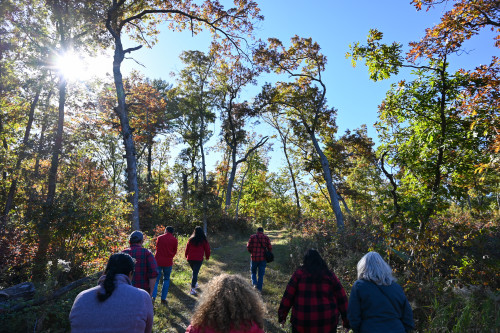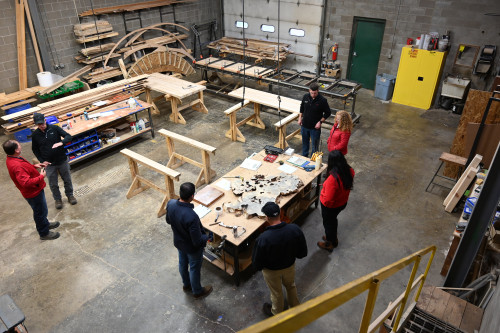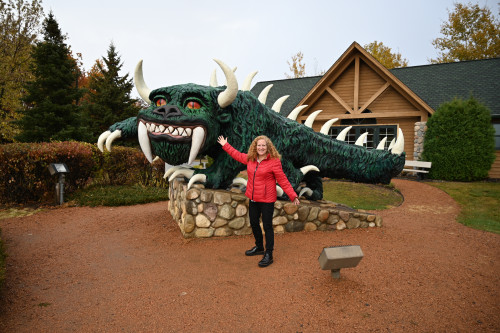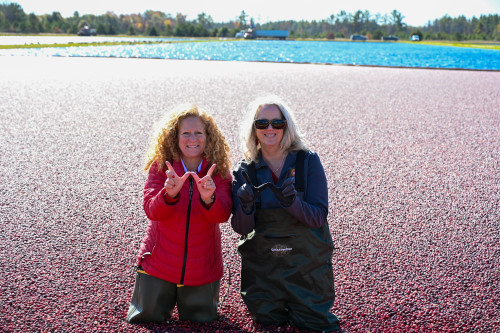UW–Madison Senior Director of State Relations and Statewide Outreach Crystal Potts, UW–Madison School of Agricultural and Life Sciences Dean Glenda Gillaspy, Ho-Chunk Nation District 1 Consultant Jessika Greendeer, Chancellor Jennifer L. Mnookin, UW–Madison Director of Tribal Relations Carla Vigue and Ho-Chunk Nation DNR Government Director Brandon Bleuer pose for a photograph on the 9 Eagles Property on Ho-Chunk Nation land that overlooks the Wisconsin River in Lyndon Station. Photograph by Anna Barry/UW–Madison
Badgers have a robust presence in Monroe and Juneau counties in central Wisconsin, and in Oneida and Vilas counties within the Northwoods. Mixed, greater than 200 present UW–Madison undergraduates, 2,347 alumni and 118 staff reside in simply these 4 counties. Add that to the 2 analysis facilities and partnerships with dozens of native companies, well being care facilities and academic establishments situated throughout the realm.
These college partnerships have been on the middle of UW–Madison Chancellor Jennifer L. Mnookin’s go to to the 4 counties the week of Oct. 14. It was additionally an opportunity to discover new alternatives that improve the realm’s pure assets, construct the state’s financial system and advance necessary analysis.
“There are such a lot of superb tales, connections and strengths to speak about,” Mnookin stated in regards to the college’s relationship to Wisconsinites throughout her go to to Trout Lake Station close to Boulder Junction.
The UW–Madison Heart for Limnology operates Trout Lake Station, which is celebrating 100 years supporting environmental and limnological analysis, coaching and outreach in Wisconsin’s Northwoods. The station helps year-round analysis and group engagement, offering public talks and species identification providers to residents.

UW–Madison researchers, workers, organizational companions, alumni and group members tour Trout Lake Station close to Boulder Junction as a part of a go to to Oneida and Vilas counties. Photograph by Anna Barry
Gretchen Gerrish, the director of Trout Lake Station, led Mnookin on a tour of the power together with Karl Martin, dean and director of UW–Madison Division of Extension, and Troy Runge, affiliate dean for analysis on the School of Agricultural and Life Sciences.
The subjects being researched on the station join immediately with challenges and wishes confronted by space residents, Gerrish stated.
“Water is a unifier. Residents work together with it on a regular basis,” he stated.
Along with a facility tour, Mnookin participated in a round-table dialogue with Trout Lake Station researchers and workers and members of accomplice establishments, together with the Wisconsin DNR, Nicolet School and the native UW–Madison alumni chapter.
Throughout the dialogue, each Mnookin and Nicolet School President Kate Ferrel famous a lately introduced partnership that creates a seamless pathway for Nicolet School college students to switch to UW–Madison On-line, showcasing the brand new alternative for them to earn a Bachelor of Enterprise Administration diploma with out leaving the Northwoods.
Following the roundtable, Mnookin traveled to the Kemp Pure Sources Station close to Woodruff.
Operated by CALS, Kemp helps analysis on forest and wildlife ecology, with a robust emphasis on accountable administration of native pure assets. Kemp Station’s 231 acres help a few of the final remnants of old-growth forest within the Lake States, and scientists from CALS and from quite a few out-of-state universities have used Kemp to check fungi, vegetation, mammals, birds, reptiles, amphibians, fish and bugs.
Chancellor Mnookin additionally traveled to Rhinelander to go to Enterprise Wooden Merchandise — a family-owned enterprise led by UW–Madison alum Tom Ory that produces customized wooden merchandise from regionally sourced timber. The go to drove residence the significance of the wooden product trade in northern Wisconsin communities and, consequently, the importance of the continuing analysis and outreach efforts bolstered by Kemp Pure Sources Station.

Within the wooden store at Enterprise Wooden Merchandise in Rhinelander, Wisconsin, Tom Ory and Steve Ory describe refinishing a maple trunk chopping to arrange it to turn out to be a desk. Photograph by Katie McMullen
Having fun with the height autumn colours, Mnookin visited a famend Northwoods landmark: the Hodag sculpture in Rhinelander.

Chancellor Mnookin poses in Rhinelander, Wisconsin in entrance of a illustration of “The Hodag,” a legend that has turn out to be the town’s official image (and highschool mascot).
“What an exquisite a part of our nice state!” noticed Chancellor Mnookin.
In Monroe County, Mnookin visited Russell Rezin & Son Cranberry Marsh, a fifth-generation household farm in Warrens. Rezin & Son has ongoing partnerships with researchers at CALS to enhance farming and manufacturing. Pest management, frost safety and nutrient administration are just some areas Wisconsin cranberry growers and UW–Madison researchers have labored collectively to enhance.

Chancellor Mnookin and CALS Dean Glenda Gillaspy get their ft moist in a cranberry marsh.
State Rep. Nancy VanderMeer and CALS Dean Glenda Gillaspy additionally joined to debate potential future collaborations associated to agriculture, pure assets administration, and financial development in central Wisconsin.
In Juneau County, Mnookin visited Ho-Chunk Nation land overlooking the Wisconsin River close to Lyndon Station. The Ho-Chunk Nation’s DNR is at present doing initiatives on the 9 Eagles Property that embody wildlife knowledge assortment and an oak savannah restoration. Representatives of UW–Madison and the Ho-Chunk Nation mentioned the continuing work and potential future analysis collaborations on the positioning.
“That is all a couple of partnership all the best way round, not simply between our Nation and the college. We’re all simply attempting to be good residents and good kinfolk to at least one one other,” stated Ho-Chunk Nation District 1 Legislator Jessika Greendeer, who met with UW–Madison representatives at 9 Eagles.
Greendeer shared her hope that working with organizations equivalent to UW–Madison will result in quicker options to necessary issues.
“A number of this work is legacy work. It’s not about what we’re going to see; it’s about what the subsequent generations are going to see and expertise,” she added.
Gillaspy famous that participating with Native Nations permits entry to their distinctive experience. “You may method some totally different issues that perhaps we weren’t approaching on the college,” she stated. “It’s a real partnership, and in any good partnership, each entities ought to profit from it.”
“The extra we get a way of what the Ho-Chunk Nation’s priorities are and the way we may help help them for schooling and analysis and outreach, the higher we will work collectively and the higher we will serve the entire state,” Mnookin stated. “That’s what our shared future is all about.”
Subscribe to Wisconsin Concepts
Need extra tales of the Wisconsin Concept in motion? Signal-up for our month-to-month e-newsletter highlighting how Badgers are taking their schooling and analysis past the boundaries of the classroom to enhance lives.






























































